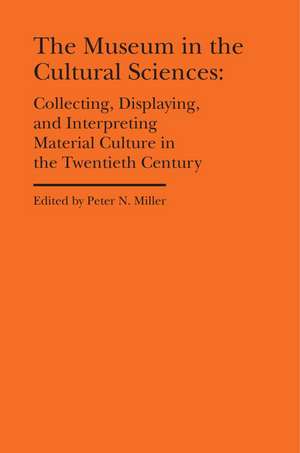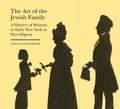The Museum in the Cultural Sciences: Collecting, Displaying, and Interpreting Material Culture in the Twentieth Century: Bard Graduate Center - Cultural Histories of the Material World
Editat de Peter N. Milleren Limba Engleză Hardback – 17 aug 2021
The Museum in the Cultural Sciences offers the first full English translations of these articles, which remain influential in conversations about the implications of art, historical, and ethnographic museums. They show how sophisticated the discussion of museums and museum display was in the early twentieth century and how much could be gained from revisiting these reflections today. Accompanied by short commentaries from museum professionals, these articles offer an intervention into and intensification of the current debate about the function and purpose of museums.
Preț: 404.30 lei
Nou
Puncte Express: 606
Preț estimativ în valută:
77.36€ • 80.99$ • 64.01£
77.36€ • 80.99$ • 64.01£
Carte disponibilă
Livrare economică 15-29 martie
Livrare express 04-08 martie pentru 41.38 lei
Preluare comenzi: 021 569.72.76
Specificații
ISBN-13: 9781941792162
ISBN-10: 1941792162
Pagini: 394
Dimensiuni: 152 x 229 x 41 mm
Greutate: 0.68 kg
Editura: BARD GRADUATE CENTER
Colecția Bard Graduate Center
Seria Bard Graduate Center - Cultural Histories of the Material World
ISBN-10: 1941792162
Pagini: 394
Dimensiuni: 152 x 229 x 41 mm
Greutate: 0.68 kg
Editura: BARD GRADUATE CENTER
Colecția Bard Graduate Center
Seria Bard Graduate Center - Cultural Histories of the Material World
Notă biografică
Peter N. Miller is dean and professor at Bard Graduate Center.
Cuprins
Series Editor’s Preface
Acknowledgements
A Note on the Text
Introduction: What Kind of Knowledge Is Museum Knowledge?
Peter N. Miller
Part I: From the pages of Museumskunde
The Historical Museum: Its Character, Its Work, and How It Differs from Museums of Art and Applied Arts
By Otto Lauffer
On the Ideals and Practical Tasks of Ethnographic Museums
By Oswald Richter
Part II: Reflections on Reading Lauffer and Richter Today
Youth and Arrogance
Julien Chapuis (Bode Museum, Berlin)
Oswald Richter and “The Purity of the Specific Local Culture”
Edward Cooke, Jr. (Yale University)
“Certain Secondary Tasks of Ethnographic Museums”: Richter’s Writings and the Role of Ethnographic Museums in Germany’s Colonial Period
Viola König (Freie Universität Berlin, Berlin)
Perfecting the Past: Period Rooms Between Disneyland and the White Box
Deborah L. Krohn (Bard Graduate Center)
Categories with Consequences
Alisa Lagama (Metropolitan Museum of Art)
Visions of Juxtaposition: Peiresc/Bataille: Monuments/Documents
Peter N. Miller (Bard Graduate Center)
The Future in the Past
Glenn Penny (University of Iowa)
Triangulating Art/Artifact: Indigenous Studies as the Third Term
Ruth Phillips (Carleton University)
Richter and Us
Jeffrey Quilter (Peabody Museum of Anthropology, Harvard University)
An Attempt at Order in a Time of Flux
Matthew Rampley (Masaryk University Brno)
Words and Things
Anke Te Heesen (Humboldt University)
Mix It Up: Five Observations on Collections and Museums
Nicholas Thomas (Museum of Archaeology and Anthropology, Cambridge University)
Life and Death in the Museum
Céline Trautmann-Waller (Université Sorbonne Nouvelle-Paris 3)
Photographs, Showcases, and Multiple Agencies: Modes of Representation and Directions of Gaze
Eva-Maria Troelenberg (Utrecht University)
The Museum Beyond Walls
Mariët Westermann (NYU Abu Dhabi)
Conclusion: Max Weber in the Museum
Peter N. Miller
Index
Acknowledgements
A Note on the Text
Introduction: What Kind of Knowledge Is Museum Knowledge?
Peter N. Miller
Part I: From the pages of Museumskunde
The Historical Museum: Its Character, Its Work, and How It Differs from Museums of Art and Applied Arts
By Otto Lauffer
On the Ideals and Practical Tasks of Ethnographic Museums
By Oswald Richter
Part II: Reflections on Reading Lauffer and Richter Today
Youth and Arrogance
Julien Chapuis (Bode Museum, Berlin)
Oswald Richter and “The Purity of the Specific Local Culture”
Edward Cooke, Jr. (Yale University)
“Certain Secondary Tasks of Ethnographic Museums”: Richter’s Writings and the Role of Ethnographic Museums in Germany’s Colonial Period
Viola König (Freie Universität Berlin, Berlin)
Perfecting the Past: Period Rooms Between Disneyland and the White Box
Deborah L. Krohn (Bard Graduate Center)
Categories with Consequences
Alisa Lagama (Metropolitan Museum of Art)
Visions of Juxtaposition: Peiresc/Bataille: Monuments/Documents
Peter N. Miller (Bard Graduate Center)
The Future in the Past
Glenn Penny (University of Iowa)
Triangulating Art/Artifact: Indigenous Studies as the Third Term
Ruth Phillips (Carleton University)
Richter and Us
Jeffrey Quilter (Peabody Museum of Anthropology, Harvard University)
An Attempt at Order in a Time of Flux
Matthew Rampley (Masaryk University Brno)
Words and Things
Anke Te Heesen (Humboldt University)
Mix It Up: Five Observations on Collections and Museums
Nicholas Thomas (Museum of Archaeology and Anthropology, Cambridge University)
Life and Death in the Museum
Céline Trautmann-Waller (Université Sorbonne Nouvelle-Paris 3)
Photographs, Showcases, and Multiple Agencies: Modes of Representation and Directions of Gaze
Eva-Maria Troelenberg (Utrecht University)
The Museum Beyond Walls
Mariët Westermann (NYU Abu Dhabi)
Conclusion: Max Weber in the Museum
Peter N. Miller
Index
Recenzii
“This well-curated book collects, prepares, and showcases two rare and vital samples of modern museological thought, studied and discussed by leading contemporary museum directors and historians of art and science, so as to better understand cultural history from its origins to its present decolonization.”
“What are historical and ethnographic museums for, and what should they display? This fascinating book juxtaposes the insights and critiques of two early twentieth-century German curators with the reflections of contemporary museum professionals and historians, revealing that, at least since 1900, thinking about and with non-art objects has been a fundamental, if perennially controversial, part of world history and European self-consciousness.”
"Museums have always been good to think with and argue about. This is a book we have all been waiting for, bringing into the conversation the deep German tradition of museology, linked also to the latest discussions on indigenous perspectives and property. A wonderful cultural and intellectual achievement."







